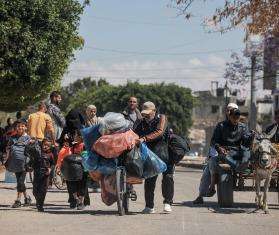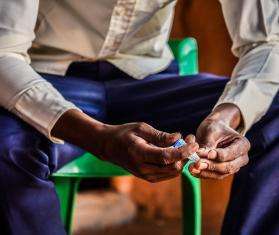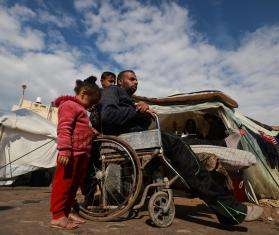NEW YORK/BAMAKO, APRIL 16, 2020—The international medical humanitarian organization Doctors Without Borders/Médecins Sans Frontières (MSF) has been working closely with Mali’s Ministry of Health (MoH) over the last few weeks to treat patients with COVID-19, the disease caused by the novel coronavirus.
So far, 15 people have been treated in Centre Hospitalier Universitaire du Point G (Point G) in Bamako in the past three weeks. Three of those patients are in the intensive care unit and six have since recovered and have been discharged. Since March 25, 116 people have been confirmed to have COVID-19 and 10 people have died from the disease in Mali.
A dedicated treatment center
Health authorities have set up a referral center in Point G hospital—a specialized facility created to treat diseases with epidemic potential that is now being used for COVID-19—where patients can be isolated and treated.
MSF has assigned a doctor, nurse, and hygienist to help in the triage zone at the entrance. Additionally, seven other MSF nurses and three doctors have been integrated into the MoH’s health team inside the hospital to work in the treatment unit, and the organization is recruiting ten hygienists to join them. For the time being, the unit has eight beds, but a building with capacity for up to 100 beds is being constructed near this facility.
Patients showing signs of the virus and who need medical care are immediately transferred to the treatment unit. All suspected cases are tested for the virus by teams from the National Institute of Public Health, which take the samples in the hospital and then transport them to an off-site laboratory.
While waiting for the results, patients are isolated and put under observation in a zone. That zone currently has two beds, but MSF would like to increase it to seven beds.
Given that this unit is often at capacity, some patients who are confirmed to have coronavirus are referred to Hôpital du Mali and Hôpital Dermatologique. MSF has provided technical support to both hospitals with setting up patient flow to align with the best infection prevention and control practices.
Administering oxygen to patients
Patients with severe coronavirus symptoms generally have hypoxia—a condition where the body doesn’t have enough oxygen—and need oxygen. Depending on how much the patient requires and the available medical equipment, it is delivered by different devices such as oxygen concentrators.
Point G hospital has an oxygen production unit. MSF is working with hospital management to improve the flow of oxygen from the production unit by installing a wall-mounted supply system so that, in the new building, oxygen can be delivered directly to the patient’s bed.
All treatment, including oxygen, is provided free of charge to patients with COVID-19.
Protecting health workers and preserving access to non-COVID care
Protecting medical staff and those most at risk of developing severe forms of the disease, such as the elderly and those with chronic conditions like diabetes, cancer, high blood pressure, or other cardiovascular problems, is a real challenge as the world faces mounting pressure on the manufacturing of personal protective equipment like masks.
Protecting medical teams from the risk of contracting coronavirus is absolutely crucial in being able to continue to provide care. In Bamako, this is an issue that affects more than just the COVID-19 treatment unit. MSF has been supporting the hospital’s haematology-oncology department since the end of 2018.
"Maintaining this activity is one of our priorities so that patients who have cancer can continue their treatment and those who need it can be put on it,” said Dr. Idrissa Compaore, MSF’s medical coordinator in Mali.” But it’s going to be a problem if we don't have sufficient supplies of masks and equipment to ensure the protection of these particularly vulnerable patients and the staff following them.”
Taking action to prevent the spread of the virus
While MSF is treating patients in places like Point G, most of the battle against COVID-19 is being fought outside of hospitals.
MSF teams are supporting MoH teams who go to Bamako neighborhoods to inform people about what they should do to protect themselves from the virus and avoid spreading it to those around them. MSF has set up water points—approximately 30 so far—to facilitate hand-washing in the most crowded places and is planning to extend these initiatives.
MSF teams are deployed in places other than Bamako as well to assist people with urgent needs but little access to healthcare, particularly in conflict zones in central and northern Mali. The organization has programs in Douentza, Ansongo, Koutiala, Ségou, Ténenkou, Niono, and Koro. Teams there are enhancing prevention, hygiene, and infection control measures and setting up spaces for isolating potential COVID-19 patients in all the medical facilities where they work.
As part of the response to COVID-19, MSF is also helping the MoH with activities such as staff training and raising public awareness in regions where the organization is already working. Hospitals in Gao and Sévaré have also received technical support.
Mali: MSF treats coronavirus patients

© Shutterstock



